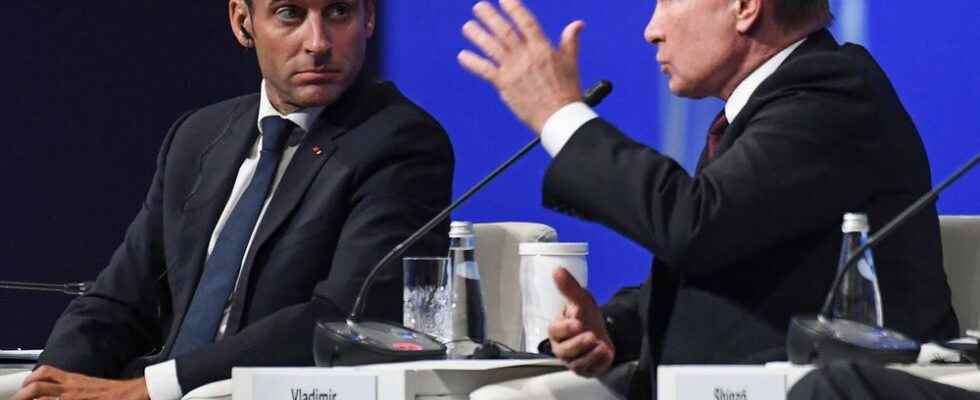At the Louis-Vuitton Foundation, sweet words were still in order between Paris and Moscow, on this evening of September 21, 2021. “There is such a story, such an understanding of what the French soul and the soul Russian”, took to philosophizing Emmanuel Macron, at the inauguration of the Morozov exhibition in the French capital. It “forces us to continue to work, despite the turpitudes of the present time and circumstances, to continue to bring the two countries closer”, he added, in front of the Russian Minister of Culture Olga Lyoubimova, she presents at this social event organized in this building designed by Frank Gehry, in the heart of the Bois de Boulogne.
Four months later, it is however on the contrary the “turpitudes of the present time” which lead the Head of State to speak by telephone with his Russian counterpart this Friday. In the background, the growing fear of an armed conflict between Moscow and Kiev, while tensions are growing around the question of Ukraine. “The president will meet (…) with Vladimir Putin to, basically, offer him a path of de-escalation,” said the Elysée on Monday. Will the “special relationship” built with the head of the Kremlin over the past four years help him?
“We should not expect a de-escalation in Ukraine at the end of this discussion, because this crisis concerns the question of European security and NATO and goes beyond France, de facto, believes Carole Grimaud Potter , founder of the Center for Russia and Eastern Europe Research, based in Geneva. On the other hand, Macron can serve as a mediator and transmission belt for the European Union, as Merkel did in her time.”
Highs and lows
Unlike many European leaders, Emmanuel Macron had from the start of his mandate pleaded for a rapprochement with the head of the Kremlin, despite the dispute over the annexation of Crimea in 2014. Two weeks after his entry into the ‘Elysée, on May 30, 2017, he reveals the contours of his doctrine by receiving his Russian counterpart at the Palace of Versailles. “We told each other everything, we share disagreements but at least we mentioned them”, he had summarized at the end of a “cash” dialogue, claiming to want to move forward “on common solutions”.
Troubles, however, quickly arrived. A few months later, in March 2018, ex-Russian agent Sergei Skripal and his daughter were poisoned in a park in Salisbury, south of England. The nerve agent used, Novichok, bears the mark of the Russian secret service. Quickly implicated, Moscow faces a Western outcry: more than 150 Russian diplomats are expelled, unheard of since the Cold War. In France, they are four in number, Russia responds in the same way.
French President Emmanuel Macron and his Russian counterpart Vladimir Putin at the Saint Petersburg Economic Forum on May 25, 2018
afp.com/Kirill KUDRYAVTSEV
Year after year, Emmanuel Macron still accepts the invitation of the head of the Kremlin to Russia two months later, on the occasion of the St. Petersburg Economic Forum. “A dialogue is always better than a confrontation”, underlines Vladimir Putin at the end of a tete-a-tete at the Constantin Palace, about twenty kilometers from the former Russian imperial capital. Beyond the declarations of intent concerning better bilateral coordination, it is however difficult to see any real diplomatic progress.
“The hopes of reset have led to quite a few things”, notes Carole Grimaud Potter. “On the Kremlin side, I think that the Macron presidency was a little disappointing, insofar as it did not result in an easing of sanctions against Russia .”
“No obvious results”
A new attempt at rapprochement was attempted in the summer of 2019, at Fort Brégançon where the French president received the head of the Kremlin for a “working visit”. “We believe in Europe, which goes from Lisbon to Vladivostok”, assured him Emmanuel Macron, who then hoped to “reattach Russia to Europe”. Pledge is made to travel to Moscow on May 9, 2020 for the 75th anniversary of the Soviet victory over Nazi Germany. But due to the Covid-19, the meeting will never take place.
Emmanuel Macron and Vladimir Poutine, on May 29, 2017 in the Battles Gallery of the Palace of Versailles.
Stéphane de Sakutin/AFP
The following summer, in August, the tone hardened once again after the poisoning of the Russian opponent Alexeï Navalny, in Novichok, once again. “The affair cast a chill, remembers Sylvie Bermann, former French ambassador to Russia (2017-2019). All the more so when Vladimir Putin suggested that Navalny may have poisoned himself…” His imprisonment upon his return to Russia in February 2021 – after six months of treatment in Germany – has hardly helped matters since.
“From the start, Macron’s Russian diplomacy has consisted of a subtle mix of dialogue and firmness, the dosage of which may have varied at different times,” observes Tatiana Kastoueva-Jean, director of the Russia center at the French Institute of International Relations. (Ifri). This approach has certainly not had obvious results, nevertheless its merit is to have at least maintained the dialogue despite the disagreements.”
This desire to keep the channels of discussion open is not, however, shared by all Europeans, particularly in the former countries of the Soviet sphere of influence. Last June, when Emmanuel Macron and former German Chancellor Angela Merkel had proposed the holding of a summit between the EU and Russia, they had suffered the clear refusal of several Member States, starting with Poland and the Baltic countries. They feared that the initiative would send a “bad signal” in the face of Putin’s belligerent behavior. It is not said that the French initiative arouses more enthusiasm today in these same countries.
